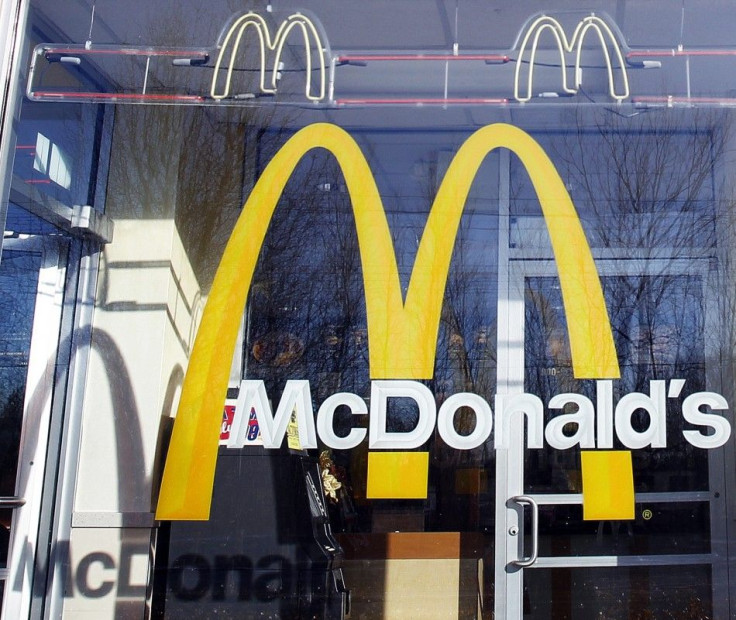McDonald’s: Should It, Other Fast-Food Chains, Be Banned?
ANALYSIS

The brand has become synonmous with U.S. popular culture -- without question one of the most successful branding and marketing stories of the modern era. The brand? McDonald's (MCD).
It is the largest chain of fast-food restaurants in the world, and has become a symbol of America's modern popular culture, but does McDonald's represent the best that the nation has to offer?
In other words, could one make a case to ban/outlaw what has become a multi-national Leviathan called McDonald's, on the grounds that it doesn't represent the best that the United States can offer?
Indeed one can, and here are 5 reasons:
1 High-fat, high-salt, high-sugar menu. Although McDonald's has implemented menu changes designed to increase the nutritional value of its meals, including offering salads, McDonald's fast-food menu remains high in fat, salt, and sugar.
A great deal of the food offered is exactly what you should not eat -- processed, high-fat food that in many cases will result in unwanted weight gain, if consumed regularly.
You'd be much better off buying food in whole, original forms (vegetables, grains, fruits, fish/modest meat portions, etc.), and using seasoning and spices for flavor, among other flavor tactics.
2 Corporatized food. Also, McDonald's, like other fast-food chains, features banal, cookie-cutter venues that are virtually indistinguishable, regardless of location.
From an atmosphere standpoint, you'd be much better off sampling one of local, roadside restaurants on the Food Network's show Diners, Drive-Ins and Dives also known as The Triple D, hosted by Guy Fieri. Just one sample of a locally-prepared mushroom-sautéed burger from a local restaurant in the Midwest, or traditional Cajun cuisine in Louisiana, and you'll never go back to a McDonald's again.
Underscoring -- there is no comparison: you'll almost always do better, from a nutritional standpoint and a freshness standpoint, with a locally-run eatery, and there are thousands to choose from across the U.S.
3 Instant gratification. Like other fast-food chains, McDonald's promotes an instant gratification culture. The fast market is probably the U.S. restaurant industry's worst change -- as the best food takes at least some time to prepare. For examples of the above, again, watch The Triple D. More broadly, the instant gratification tactic imprints exactly what young people should not learn: they should be taught the opposite -- that the best and most important things in life -- including meals/dining -- take time, and require preparation, practice, patience, and perseverance.
4 Bad image of the United States. A case can also be made that McDonald's does not represent the best that the United States has to offer, culturally. To say that one of the symbols synonymous with American business and modern popular culture is a high-fat, processed-food, fast-food chain doesn't exactly speak well of that nation or its people, or have historians and archivists scurrying to prepare another time-capsule, dedicated to fast-food chains.
5 Worker exploitation. Most distressingly, McDonald's, of course, like many other fast-food chains and service sector companies, exploits workers and underpays them.
For decades, McDonald's has asserted that it can not pay its service workers more money because it just does not have the resources to do so, but its revenue, operating margins, and other business fundamentals contradict that: McDonald's, whose stock closed Friday at $85.03 per share, will likely post 2011 revenue of $26.7 billion, according to a Thomson Reuters First Call analysts survey.
McDonald's market capitalization is also $87.9 billion.
If McDonald's was ranked as a country, it would be the 60th largest country in the world, as ranked by GDP.
The real reason McDonald's underpays its service workers? It knows it doesn't have to increase wages to attract the labor needed to perform many tasks -- in many markets it has a seemingly never-ending supply of new employees -- and in many cases these are young adults -- to fill the positions vacated when existing service workers leave.
In other words, McDonald's underpayment of service sector workers is not based on low revenue -- its revenue is massive -- rather, it's rooted in the philosophy that argues it's o.k. to exploit someone and pay him/her a sub-living wage, if you have the economic power, and the operational leverage/flexibility, to do so.
In that sense, McDonald's, like other fast-food chains, promotes an economic and social Darwinism that says the market -- not societal or human values -- is supreme and the guiding force in commercial activity. It's an economic philosophy that's almost guaranteed to worsen the U.S.'s maldistribution of income and wealth, and its resultant social, cultural, and economic ills.
MCD: The Societal Cost/Benefit Analysis
To be sure, one can always point to the jobs McDonald's creates and the amount of economic activity it generates as legitimate positives for society.
But when you weigh the above against a high-fat/high-salt diet of processed food, it's cookie-cutter restaurant venues, its promotion of instant gratification, and its underpayment of whole segments of the workforce, one could make a case that a society and nation should rid itself of this deeply flawed institution.
At minimum, one could make a very strong case to not patronize -- or let your children patronize -- McDonald's, or other fast-food chains -- a lamentable part of modern American culture.
© Copyright IBTimes 2024. All rights reserved.











